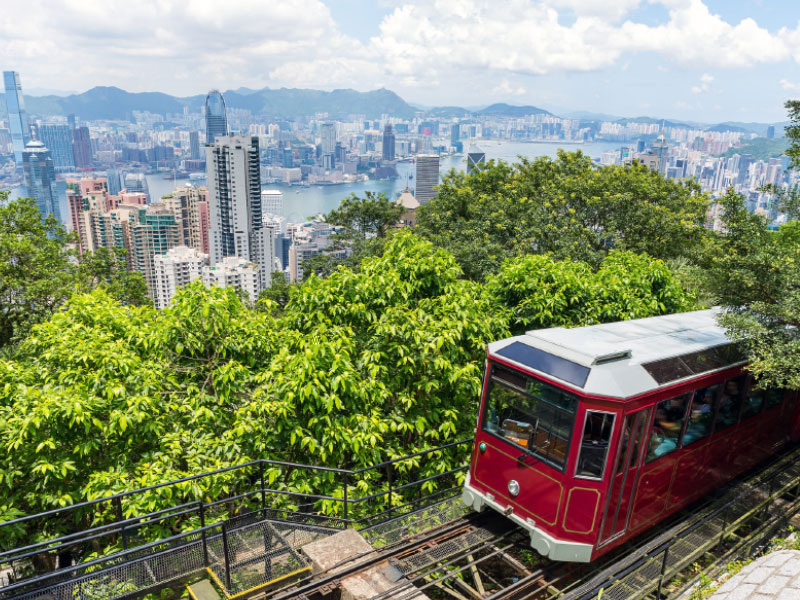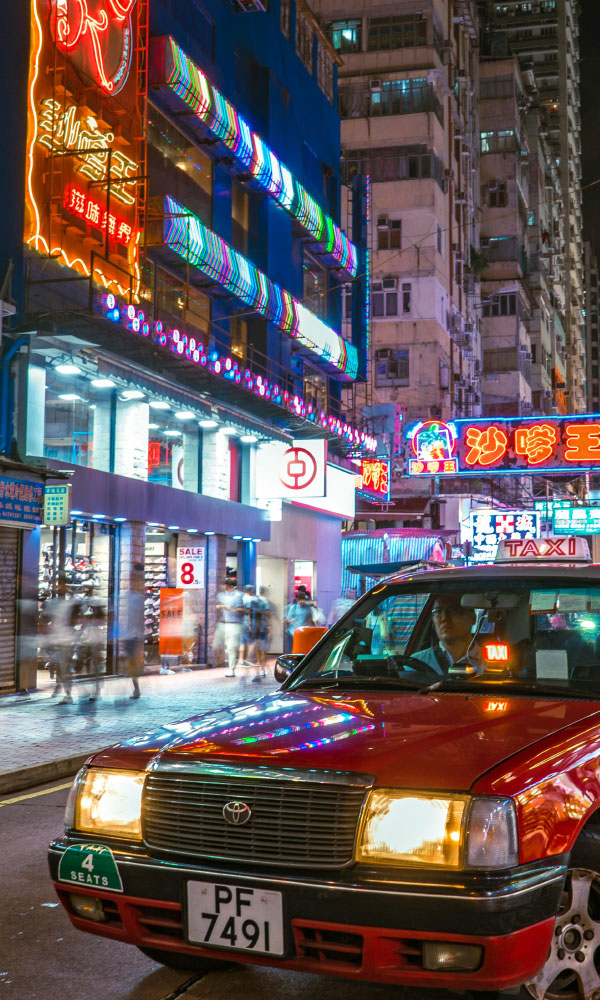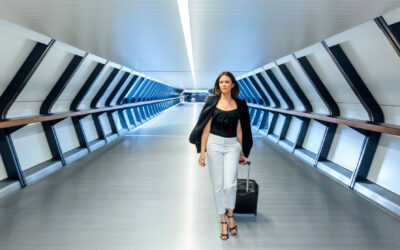Hong Kong: A Business Traveller's Guide
your complete introduction to the city where East meets WestTravelling to Hong Kong?
Are you planning on travelling to Hong Kong for work? Get to know the Chinese city better in this comprehensive guide for business travellers.
Strategically located in South China, Hong Kong offers unparalleled access to the burgeoning Asian market and is often defined as the city where East meets West.
Colonial-era architecture stands proudly beside soaring modern structures, while ancient temples co-exist with bustling financial districts. This harmonious blend reflects Hong Kong’s fascinating history as a British colony that later transitioned to a Special Administrative Region (SAR) of China. As a result, Hong Kong boasts its own legal and economic system, offering a taste of the West with undeniable Chinese roots.
While Hong Kong operates at a fast pace, there’s a warmth and hospitality that shines through. The city boasts a well-developed public transportation system, making it easy to navigate – the MTR (Mass Transit Railway) is clean and efficient and goes almost everywhere. Plus, with business interests extending from financial services and high-powered banking to technology and global shipping, opportunities are at an abundance.
In this comprehensive guide to Hong Kong for business travellers, we delve deeper into navigating the city’s unique corporate landscape, offer our top tips for getting around, and pick out our top 3 things to see or do to make your trip unforgettable.
Hong Kong Fact File

The regional emblem of Hong Kong featuring an outer ring which shows the official name of the territory in Traditional Chinese.
Languages
The official languages are English and Chinese (Cantonese), with Hakka, Southern Min, and Mandarin also spoken.
Currency
Hong Kong Dollar (HK$)
Avg. Temperatures
Spring (Mar-May) = 23°C (73.4°F)
Summer (Jun-Aug) = 28.5°C (83.3°F)
Autumn (Sep-Nov) = 28°C (82.4°F)
Winter (Dec-Feb) = 16°C (61°F).
Getting To Hong Kong
By Air (飛機)
Located on a man-made island called Chek Lap Kok, west of Lantau Island, Hong Kong International Airport (HKG) offers international flights and is well-connected to the city centre via Airport Express trains, buses, and taxis. The ultra-modern facility was even ranked 33rd best airport in the world in 2023 at the World Airport Awards.
By Road (車)
Driving to Hong Kong has been made largely redundant due to the city’s excellent public transport network. However, if you are planning on taking a car, an International Driving Permit (IDP) alongside your home country’s license is required. You’ll also need to navigate border crossings from mainland China, requiring additional paperwork.
By Train (火车)
The high-speed Guangzhou-Shenzhen-Hong Kong Express Rail Link connects the city to mainland China on a service which can travel at speeds of up to 300km/h. The main terminus is the West Kowloon Station in Kowloon which lies right in the heart of the city. Be aware that you will have to pass through mainland China border patrol.
Business Culture & Etiquette
Hong Kong is the very definition of a 21st-century city, with a slick, almost science-fiction, atmosphere mirroring the way locals do business.
Time is a precious commodity in Hong Kong and wasting a single second is considered a business faux pas. Be punctual for meetings and get straight to the point – HKers hugely appreciate brevity that packs a punch.
Formality is also a cornerstone of Hong Kong’s business culture. Opt for conservative business attire: Suits are standard for men, while tailored skirts or trousers paired with blouses are appropriate for women. Flashy jewellery or overly casual attire can be seen as disrespectful.
It is common for business in Hong Kong to be conducted over formal dinner meetings. In these scenarios, the host typically orders, and it’s considered polite to decline multiple times before accepting additional food or drinks. This demonstrates humility and respect for their hospitality
Here are a few other top business tips:
- A business card exchange is a customary greeting ritual in Hong Kong. Present your card with both hands and take a moment to examine your counterpart’s card before putting it away.
- Understanding some basic Cantonese phrases goes a long way. A simple “thank you” (多謝, do jeh) or “you’re welcome” (唔使客, m bud sihk hak) can show your respect for the local culture and create a positive impression.
Crime & Safety
Hong Kong boasts an impressive safety record, with a very low overall crime rate. According to the Hong Kong Police Force’s 2022 crime statistics, overall reported crimes decreased by 8.7% compared to 2021. However, petty theft, particularly pickpocketing and bag snatching, can occur in crowded areas like tourist attractions and public transportation.
Large-scale protests have been a concern in Hong Kong in recent years. However, these have become less frequent. It’s always wise to stay informed about current events and avoid any large gatherings that appear tense. If you encounter a protest, stay calm and move away from the area to avoid getting caught up in it.
Here are a few of our other top safety tips:
- In Hong Kong, the emergency number for police, fire, and ambulance services is 999. English-speaking operators are available.
- Keep valuables like wallets and passports secure in a money belt or a crossbody bag that stays close to your body. Avoid carrying excessive cash or displaying expensive jewellery.
Getting Around Hong Kong
Mass Transit Railway (地下鐵路)
The MTR (Mass Transit Railway) lies at the heart of Hong Kong’s public transport system. 11 colour-coded lines cover the entirety of Hong Kong Island, Kowloon, and the New Territories, with fares based on distance travelled. The easiest way to purchase a fare is by getting hold of an Octopus Card which can be topped up at most stations – including on the Disneyland Resort Line. Most signage is written in both English and Chinese, so there is little need for translation.

Buses (巴士)
Hong Kong boasts an extensive bus network consisting of various types of service. Officially franchised buses are operated by four major companies which can be discerned by their fleets of red double-deckers: (Kowloon Motor Bus Co., Citybus, New Lantao Bus Company, and Long Win Bus Company). Smaller, green or red minibuses also operate on specific routes at fixed fares. They’re great for short trips and reaching areas not served by franchised buses.

Taxis (的士)
Hong Kong taxis are a convenient and affordable way to get around, especially for short trips or late-night journeys. Red taxis with silver roofs are the most common type, operating in Kowloon and on Hong Kong Island. Green taxis with white roofs serve the New Territories, and Blue taxis are exclusive to Lantau Island. You can call a taxi hotline (+852 8109 2222) to request a pick-up, but there’s an additional charge for this service.
Top 3 Things To See Or Do In Hong Kong
If you find yourself with a bit of free time on your business trip, Hong Kong is an interesting and vibrant city with plenty to explore. Here are our top 3 recommendations…

1. Victoria Peak
Victoria Peak, also known as Mount Austin or simply “The Peak” to locals, is a 552ft (1,811 ft) mountain which affords stunning views of the Hong Kong metropolis.
Though hardy explorers can try to scale the peak on foot, the simplest way to reach the summit is by hopping on the Peak Tram, the oldest funicular railway in Asia, operating since 1888. Once at the top, head to Sky Terrace 428, an observation deck offering 360-degree panoramas of the city skyline, Victoria Harbour, and the surrounding islands.

2. Temple Street Night Market
Temple Street Night Market is a neon maze of intoxicating sights, sounds, and smells and is a must-visit for anyone wanting to experience Hong Kong’s thriving market culture.
Be prepared to bargain – Stall owners love to haggle and your bartering skills will be rewarded. But Temple Street is not just about shopping. The area is renowned for its fortune tellers and live entertainment, with dancers, musicians, magicians and more taking residence.

3. Tian Tan Buddha
The awe-inspiring Tian Tan Buddha statue is the jewel in the crown of Lantau Island.
Sculpted from bronze, the statue is perched atop a mountain and stands as a symbol of peace and tranquillity. When visiting, take a cable car ride up Ngong Ping 360 for breathtaking panoramic views of the island and the South China Sea before visiting the Po Lin Monastery to delve into Buddhist culture.
In Conclusion
Hong Kong is a dynamic metropolis that thrives as a business travel destination.
With a world-class infrastructure, a strategic location in the heart of Asia, and a unique cultural tapestry, there is plenty on offer for intrepid business seekers. The sleek skyscrapers of Central stand as a testament to Hong Kong’s economic prowess, while ancient temples and vibrant street markets offer a glimpse into its rich heritage.
Beyond the world of business deals, Hong Kong provides a wealth of options for exploration and relaxation. Take a thrilling ride on the Peak Tram, marvel at the awe-inspiring Tian Tan Buddha, or immerse yourself in the vibrant energy of Temple Street Night Market.
So, whether you’re a seasoned business professional seeking new opportunities or a first-time visitor to Asia, Hong Kong promises an unforgettable experience.
Related Articles
International Women’s Day 2025
Women are integral to the success of Gray Dawes. You only need to look as far as our CEO, Suzanne Horner, as proof of that fact. In this article we asked some of our amazing female staff what advice they would give to other women looking to break into the business travel industry or forge a new career.
Top Insights from the ITM Trending Event 2025
The Institute of Travel Management (ITM) have released their 2025 Trending report which explores the priorities and expectations of business travel buyers and suppliers for the year ahead. In this article, we take a look at the key takeaways from the report and find out how they might shape the future of the industry over the next 12 months.
A Day in the Life of a Data Science Engineer
With a career in Data Science that started in the supply chain industry and blossomed in the world of business travel, Karan Pandya knows a thing or two about the technical intelligence behind great companies. From researching new technology to solving global business problems with the power of data, Karan has a genuine passion for Data Science and a love for all things machine learning and AI. In this article, we chat with Karan about his day-to-day responsibilities as a Data Science Engineer at Gray Dawes Travel, his ultimate career highlights, and what it takes to work in Data Science.
LET’S TALK
Fill in the form below and we’ll get back to you as soon as we can.





